- Home
- Parnell Hall
Detective (Stanley Hastings Mystery Book 1) Page 4
Detective (Stanley Hastings Mystery Book 1) Read online
Page 4
Just for me.
The phone rang and I picked it up.
“Three-four-one-four,” I said, reciting the last four digits of my phone number, a neutral greeting that allowed me to reveal myself as the Hastings Detective Agency if I found I was dealing with someone from whom the announcement would not evoke laughter.
“Good morning, Stanley,” came the perennially cheery voice of Susan, one of Richard Rosenberg’s secretaries. Richard Rosenberg was the lawyer I worked for. Susan and Kathy were the secretaries who called me with new assignments. Susan was always cheerful. Kathy was always sour. I was never sure which irritated me more.
“Hi, Susan,” I said. “What’s up?”
“I have a new case for you,” she announced in the manner of one informing someone they have just won the lottery.
Like Pavlov’s dog, I reached for a pen.
“The client tripped on a crack in the sidewalk in front of her building and broke her leg. She’d like to see you today. She’s home now, and I told her you’d be giving her a call. The number is 718—”
Seven-one-eight was the message I’d been waiting for. Ever since the phone company split the area code for New York City, the numbers 212 and 718 held special meaning for me. Two-one-two meant Manhattan or the Bronx. Since our clients are usually not particularly wealthy—people who call a lawyer they see advertised on TV rather than their own or some friend’s recommended lawyer are generally less than wealthy—most of our Manhattan clients were from Harlem, and most of our Bronx clients were from the South Bronx. In either case, it usually meant slums or housing projects, areas in which I was liable to be the only white man for blocks. I’m not prejudiced, but I’m not crazy either.
Seven-one-eight meant Queens or Brooklyn, and though there are bad neighborhoods there too, the odds of getting a good one are a little better. And somehow, they just seem safer, probably unrealistically so, but they do. So 718 was the announcement that always came as a relief. It was kind of like not getting hit over the head.
Susan went on to confirm that the client lived in Brooklyn. A Mrs. Rabinowitz on Ocean Parkway, out by Coney Island. Better and better. An elderly Jewish woman living in a tenth-floor apartment in what was bound to be a perfectly respectable building. This was a dream assignment. Safe, secure, and way the hell out in Brooklyn. I could put it in for four hours and forty miles, easy.
I told Susan I’d take it and hung up the phone. I leaned back in my chair, took a deep breath, and blew it out again. I knew I had to pick up the phone and call Mrs. Rabinowitz, but not just yet. First I had to get my head clear. This is a godsend, I told myself. This is exactly what I needed—a nice, cushy, routine assignment, a nice bit of busywork to immerse myself in. Business as usual.
The only thing stopping me from picking up the phone was the nagging thought of the late Mr. Albrect. The late Martin Albrect—I’d been right to doubt the Morris—unless the Post was wrong, which was quite possible.
Put it out of your mind, I told myself. Fuck Albrect. He was a fool, and he got what was coming to him. Get your mind on Mrs. Rabinowitz. That’s your business. This other business, it’s got nothing to do with you.
“Yeah,” I said aloud. “It’s got nothing to do with me.”
5.
THE RECEPTION AREA AT FABRI-TEC INC. was large and lavish. The walls were lined with plush couches, where the clientele could wait comfortably to be ushered into the presence of the powers that be. Current, rather than backdate, magazines filled the coffee tables, just in case the wait should prove to be long. A coffee maker and cups were also set up for that purpose. From the decor, Fabri-Tec seemed to be doing well.
They had economized, however, on the personnel. A lone, gum-chewing girl appeared to be it. She was manning the reception desk, the company switchboard, which was a permanent fixture on the left hand corner of the desk, and an electric typewriter on a portable typing table not dissimilar to mine. A half-typed letter was in the machine, which hummed faintly. Several lines on the switchboard were lit up and several others were flashing. The receptionist, a blonde in her mid-twenties, was pushing buttons on the switchboard, saying, “Fabri-Tec,” listening for a few seconds, and then saying, “please hold.” The corner of a movie magazine protruded from beneath the blotter, doubtless stashed there for a happier and less busy time.
I was obviously an added aggravation to the receptionist, but in between phone calls she managed to force an artificial smile. “May I help you?”
I smiled back at her. “Yes,” I said. “I’m Nathan Armstrong from the Whitney Corporation. I have an appointment with Mr. Albrect.”
The receptionist paled and her smile froze. “Oh,” she said. After a pause she added, “Oh.”
The receptionist seemed to have several functions at Fabri-Tec, but apparently informing prospective buyers that company sales executives had been found dead with their dicks in their mouths was not one of them. She rose to her feet, murmured, “Excuse me a moment,” and vanished into the inner recesses of Fabri-Tec Inc., leaving countless impatient callers stranded on hold.
The phone rang three more times while she was gone. I didn’t answer it. After all, I had my own problems.
The receptionist returned with a smartly dressed young man of about thirty-five, an aggressive go-getter with the word “salesman” written all over him. He didn’t wait for the receptionist to attempt an introduction, which was probably wise under the circumstances.
“Hi, I’m Michael Murphy, executive vice president.”
He extended his hand and I shook it, wondering how many executive vice presidents a company of this kind had.
“Nathan Armstrong, Whitney Corporation,” I told him.
There was no reason for him to doubt it. I always wear a suit and tie in the practice of my profession. Richard insists on it. That’s because his TV ad promises a free consultation with a lawyer right in your own home. That, of course, is bullshit. No self-respecting lawyer is going to go running around to people’s homes trying to sign up accident cases when he can hire some schmuck like me to do it. So I have to wear a suit and tie and pass myself off as a lawyer. I never actually say I’m a lawyer, and if anybody specifically asks, I’ll admit that I’m not. I just walk in wearing a suit and say I’m Mr. Hastings from the lawyer’s office, and the clients just assume I’m a lawyer and that’s all there is to it. So I figured if the suit could make me a lawyer, it could damn well make me a businessman.
Murphy seemed to buy it. “Won’t you come in,” he said, ushering me around the reception desk and through huge oak double doors.
We passed through a short hallway and into an immense room teeming with stenographers. We zigzagged through them unobserved. Deafened by headsets, none of the typists so much as glanced up.
I found the typing pool somewhat reassuring. To tell the truth, I was a little apprehensive, or perhaps scared shitless would be more accurate, about whether I could pull off my little impersonation, seeing as how I had never done anything even remotely like it before. After the intimidating opulence of the waiting room, which had all but convinced me that I hadn’t a prayer, it was nice to discover that the grand and glorious Fabri-Tec, Inc., was a company run by mortal men, capable of designing their work space so that executive vice presidents and the buyers they were attempting to impress had to pass through the typing pool in order to get to their offices.
I followed Murphy out of the typing pool and down a long hallway to a door marked “MICHAEL J. MURPHY, EXECUTIVE VICE PRESIDENT.” I counted three other executive vice presidents on the way, and we weren’t even halfway down the corridor.
Murphy opened the door and ushered me into what proved to be his outer office, manned by a grim and efficient-looking secretary behind a desk.
“Hold my calls, Mildred,” Murphy said, and led me into his inner office and closed the door.
While Murphy’s outer office had been furnished for business, with files, typewriters, and supply cabinets, his inner offic
e was furnished to impress and entertain. Aside from the desk, on which there was not a single scrap of paper, only a phone and an intercom, the office boasted a couch, coffee table, three comfortable chairs, a bar, a stereo, and a TV complete with VCR.
“Sit down,” Murphy said, gesturing to the couch. “Would you care for a drink.”
“Little early for me,” I said, sitting on the couch. “But you go right ahead.”
“I don’t want one either,” Murphy said. He sat in one of the chairs. “Now, you say you have an appointment with Mr. Albrect?”
“That’s right.” I looked at my watch. “In five minutes, in fact.”
“And you came up here from Miami to meet with him?”
“That’s right.”
Murphy took a deep breath. “I’m afraid Mr. Albrect is not going to be able to see you.”
“Oh? Why not?”
“I’m sorry to have to tell you this, but Mr. Albrect is dead.”
“What!” I exclaimed. “You’re kidding! I just spoke to him a couple of days ago. From Miami. Are you sure?”
“Yes. I’m afraid so.”
“Oh, that’s terrible. I can’t believe it. He didn’t have any health problems, so far as I know. Maybe a little overweight. What was it, his heart?”
“No.”
“Well, what was it?”
“He had an accident.”
“An automobile accident?”
“No.”
“Well what then?”
Murphy shook his head. “I’m sorry to have to tell you this. The police found his body late last night in a parking lot. He’d been murdered. Shot to death.”
I stared at him in what I hoped would pass for shock. My mouth was open, but I held my breath for a second or two, then let it out in a whoosh. I closed my mouth, opened it again, and began breathing in short, shallow breaths. In a small, shaky voice I said, “I think I’ll have that drink now.”
I was afraid I was overdoing it, but Murphy immediately jumped up and poured me a brandy. I took a big swallow, coughed, choked, and came close to spitting it out. I swallowed, exhaled, shook my head, and took another smaller sip, hoping like hell my wife wouldn’t catch it on my breath when I got home.
Murphy watched me solicitously. “Are you all right?” he asked.
“Yeah, yeah, sure,” I said. I forced a small, nervous chuckle. “Then I guess our meeting is off,” I said in the manner of one making a feeble attempt at a joke to try to cover the embarrassment of an awkward situation.
Murphy picked right up on it, good salesman he. “That is probably a shrewd deduction,” he said with a grin.
We shook our heads and chuckled for a bit.
“Well,” I said, “what the hell am I going to do now?”
“Don’t worry,” Murphy assured me. “This is, of course, a bit of a shock, but we’ve already begun transferring all of Marty’s accounts to other executives.”
Ah! Marty. Score one for the Post.
“Now,” Murphy continued, “seeing as how you’ve come all the way from Miami, this will be given a top priority. In fact, I shall insist on handling it myself.”
He made the pronouncement in the manner of one bestowing a great favor, and I couldn’t help wondering, what with there being so many executive vice presidents and all, just what Murphy’s place on the hierarchical ladder actually was—had he outranked Albrect, or had Albrect’s demise kicked him up a rung?
“I’m not sure you can,” I told him. “Albrect and I had a special understanding.”
“Our customers always have a special understanding, Mr. Armstrong. Now, if you’ll just tell me what your understanding was, I’m sure I’ll be able to help you.”
I looked at him skeptically “You’re familiar with our account?”
“The Whitney Corporation? Yes, of course. I’ve never handled it personally—it was Marty’s account—but I’m certainly familiar with it.”
I still looked skeptical. “All right, then,” I said. “You say you’re familiar with the account? Then tell me, what is our usual order?”
Murphy went to his desk and pressed the intercom. “Mildred,” he said, “please bring me the Whitney account.”
She was fast, I’ll give her that. Either the account was cross-filed in his office, or he’d sent her for it the moment he learned I was in the building, but, in any case, Mildred delivered the file in ten seconds flat. After she’d scooted out again, Murphy crossed his legs, opened the file and said, “Now then, you asked what is your standard order?”
“That’s right.”
“That would be 25 thousand units.”
“How often?”
“Once a month.”
“At what terms?”
“For 25 thousand units we allow you the 50 thousand bracket price less 2 percent discount for net cash.”
Among the numerous jobs I have had throughout my less than distinguished writing career, was teaching algebra for one term at a private boarding school. I was 28 at the time, and the only algebra I knew was what I remembered vaguely from my junior year at high school. To make matters worse, I was pressed into service because the real algebra teacher died halfway through the school year, so the class was a whole term ahead of me when I began. Not having the faintest idea what I was doing, and not wanting to let it show, I soon developed my own method of teaching. Every time I hit a problem I didn’t understand, which was often, I would send the class genius to the board and have him do it, which he always could. I would learn the procedure by watching him, and then when he was done I could sharpshoot, offering criticism such as, “Yes, that’s very good, but in step #3 you could have combined terms before you multiplied instead of after,” which, of course, while true, had no effect on the actual answer, which was invariably right. By that device, my own version of the Socratic method, I was able to get through to the end of the term without ever having to actually admit to the students that I hadn’t the faintest idea what I was talking about.
I was using this old teaching method now. Murphy, my class genius, had been called upon to recite, and I was preparing to sit back and sharpshoot.
“The 50 thousand bracket less 2?” I said.
He checked the ledger sheet again. “That’s right.”
“Well, now—” I began.
My beeper went off. Its high pitched “Beep, beep, beep” filled the room. Christ! I’d forgotten I had the damn thing on. Now Richard’s office was beeping me. I reached quickly into my jacket and shut it off.
“What the hell was that?” Murphy said.
Before I could answer, the beeper went off again. It always went off twice when they beeped me. The second beep was supposed to be a safety check, which seemed pretty stupid to me. If the first beep didn’t work, the second one wouldn’t either, and if you heard the first beep, you didn’t need the second one.
The system of double beeping had never irritated me more than it did now.
“What is that?” Murphy said as I shut off the second beep.
“Just my office beeping me.”
Murphy stared at me. “From Miami?” he asked, incredulously.
“No, no,” I told him. “The branch office here in Manhattan. I have to call in. Could I use your phone?”
“Certainly,” he said, pointing to the desk. “Dial nine for an outside line.”
I dialed 9, got an outside line, and called Richard’s office.
Kathy answered the phone with her dulcet snarl.
“Hi,” I said. “You beeped.”
“You’re damn right, I beeped,” she said. “Mrs. Rabinowitz just called. She said you never called her.”
“I called twice and the line was busy. After that I got no answer.”
“Oh yeah? Well, she’s been there the whole time. Waiting for you.”
“Maybe you gave me the wrong number.”
Kathy was incensed. “I didn’t give you the number. Susan gave you the number.”
“Well, maybe it’s wrong. Let�
�s double check. What number do you have?”
Reluctantly, she read me the number.
“Ah, that’s it,” I told her. “You had the last digit wrong.”
“We had it right, damn it!” Kathy shrieked. “You wrote it down wrong.”
She hung up on me. I hung up too, and turned to Murphy. “I’m sorry,” I said, “but I have to make a private business call. Is there a pay phone I could use?”
I wasn’t sure if making private business calls was standard procedure in the textile industry, but if it wasn’t, Murphy never blinked an eye, just directed me to a pay phone in the lobby, which indicated either my request wasn’t that unusual, or else Whitney Corporation was one hell of a good account.
I went down to the lobby, called Mrs. Rabinowitz, apologized, told her I was tied up at the moment, and made an appointment for four in the afternoon. In the elevator on the way back up, I went over the information I’d already gleaned, preparing myself to tap dance with Murphy.
He was sitting waiting patiently when Mildred let me back into the office, further indication that Whitney Corp. was a good account.
“Sorry for the interruption,” I said breezily, going right to my chair and sitting down, as if making an extra effort at efficiency to make up for taking up so much of his time. “Now then, we have 25 thousand units a month at the 50 thousand bracket less 2. Right?”
“Right,” Murphy said.
“Fine,” I said. “Well, here’s the deal I had with Albrect. I wanted to increase that order to 50 thousand units a month.”
Murphy, who had shown only polite interest, perked right up. “Really?”
“Really.”
“At what price?”
“The 100 thousand bracket less 2.”
“Well,” Murphy said with a smile. “That seems a perfectly normal request. I see no problem with that.”
“There is one,” I told him.
“Oh? What’s that?”
“I’m not really buying them for Whitney Corp. I’m buying them for myself.”
Murphy stared at me. “Run that by me again.”

 Clicker Training
Clicker Training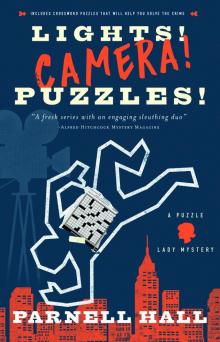 Lights! Camera! Puzzles!
Lights! Camera! Puzzles!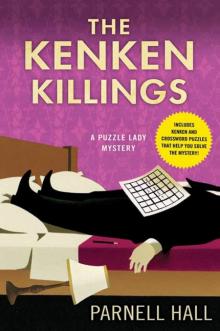 The KenKen Killings
The KenKen Killings 12-Scam
12-Scam The Puzzle Lady vs. the Sudoku Lady
The Puzzle Lady vs. the Sudoku Lady 2 Murder
2 Murder 7 Shot
7 Shot You Have the Right to Remain Puzzled
You Have the Right to Remain Puzzled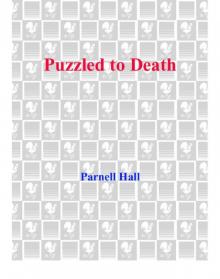 Puzzled to Death
Puzzled to Death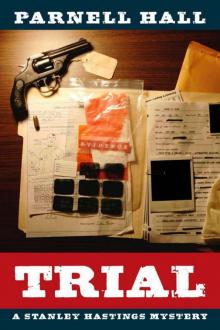 11-Trial
11-Trial The Witness Cat (Steve Winslow Mystery)
The Witness Cat (Steve Winslow Mystery) With This Puzzle, I Thee Kill
With This Puzzle, I Thee Kill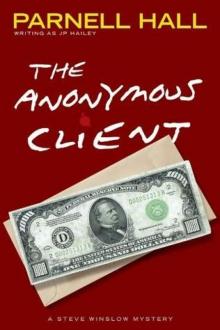 The Anonymous Client sw-2
The Anonymous Client sw-2 Death of a Vampire (Stanley Hastings Mystery, A Short Story)
Death of a Vampire (Stanley Hastings Mystery, A Short Story) The Wrong Gun sw-5
The Wrong Gun sw-5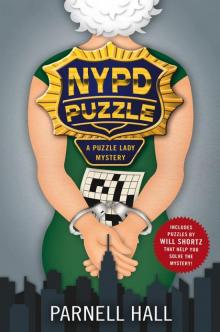 NYPD Puzzle
NYPD Puzzle 6 Juror
6 Juror 07-Shot
07-Shot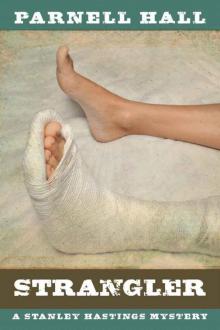 04-Strangler
04-Strangler 02-Murder
02-Murder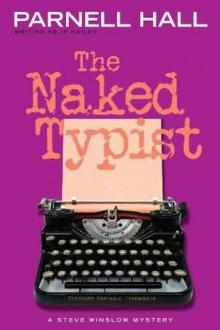 SW04 - The Naked Typist
SW04 - The Naked Typist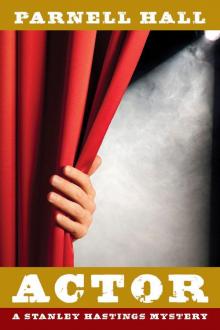 Actor
Actor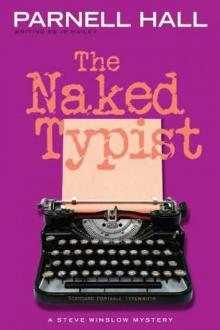 The Naked Typist sw-4
The Naked Typist sw-4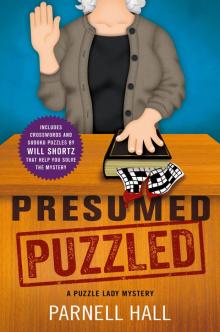 Presumed Puzzled
Presumed Puzzled SW01 - The Baxter Trust
SW01 - The Baxter Trust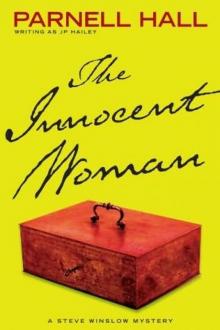 SW06 - The Innocent Woman
SW06 - The Innocent Woman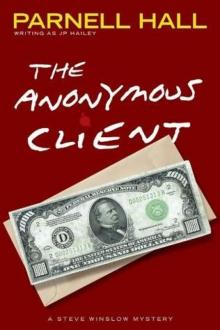 SW02 - The Anonymous Client
SW02 - The Anonymous Client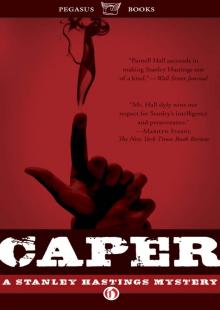 Caper
Caper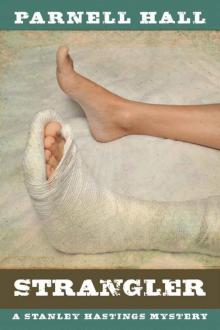 4 Strangler
4 Strangler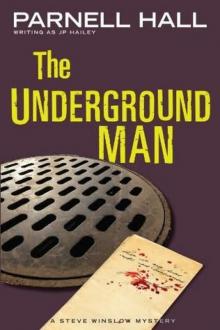 The Underground Man sw-3
The Underground Man sw-3 Manslaughter (Stanley Hastings Mystery, #15)
Manslaughter (Stanley Hastings Mystery, #15) A Puzzle to Be Named Later--A Puzzle Lady Mystery
A Puzzle to Be Named Later--A Puzzle Lady Mystery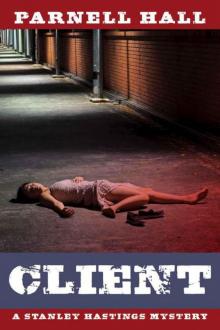 05-Client
05-Client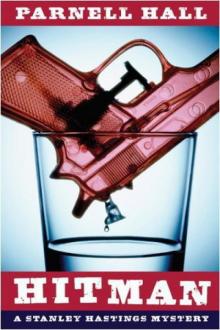 16 Hitman
16 Hitman SW05 - The Wrong Gun
SW05 - The Wrong Gun 3 Favor
3 Favor Last Puzzle & Testament
Last Puzzle & Testament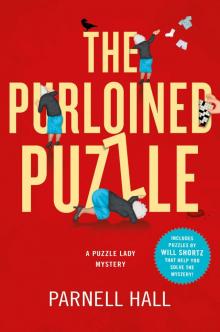 The Purloined Puzzle
The Purloined Puzzle 03-Favor
03-Favor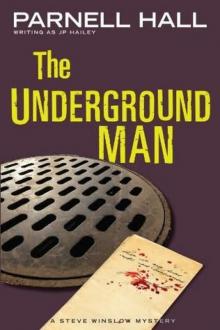 SW03 -The Underground Man
SW03 -The Underground Man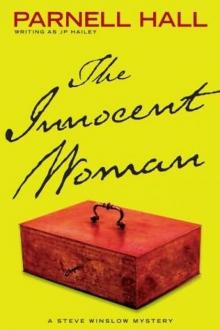 The Innocent Woman sw-6
The Innocent Woman sw-6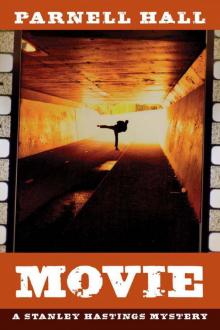 10 Movie
10 Movie 06-Juror
06-Juror Puzzled Indemnity
Puzzled Indemnity Arsenic and Old Puzzles
Arsenic and Old Puzzles Dead Man's Puzzle
Dead Man's Puzzle Safari
Safari $10,000 in Small, Unmarked Puzzles
$10,000 in Small, Unmarked Puzzles The Baxter Trust sw-1
The Baxter Trust sw-1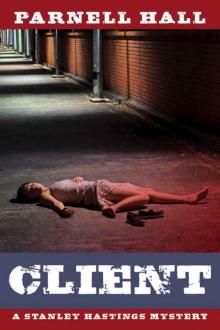 5 Client
5 Client Cozy (Stanley Hastings Mystery, #14)
Cozy (Stanley Hastings Mystery, #14)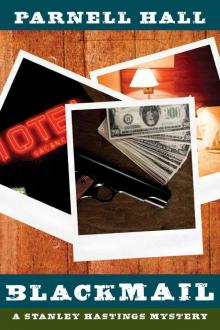 Blackmail
Blackmail A Puzzle in a Pear Tree
A Puzzle in a Pear Tree A Clue for the Puzzle Lady
A Clue for the Puzzle Lady Clicker Training (Stanley Hastings Mystery, A Short Story)
Clicker Training (Stanley Hastings Mystery, A Short Story)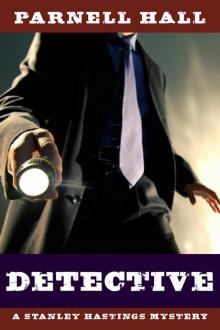 Detective (Stanley Hastings Mystery Book 1)
Detective (Stanley Hastings Mystery Book 1) 13 Suspense
13 Suspense